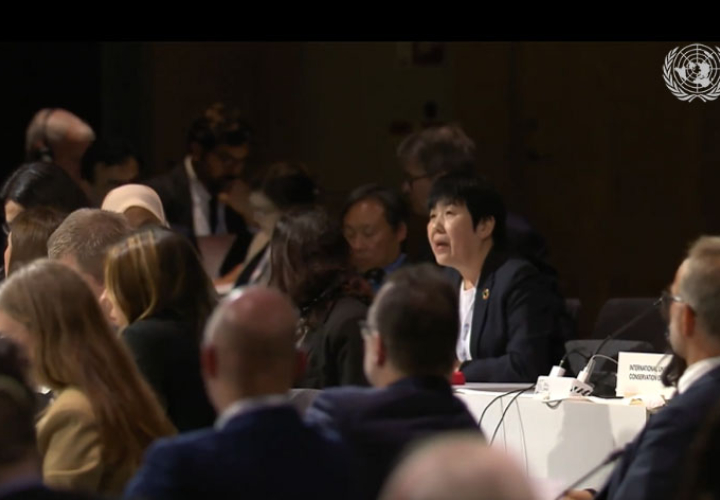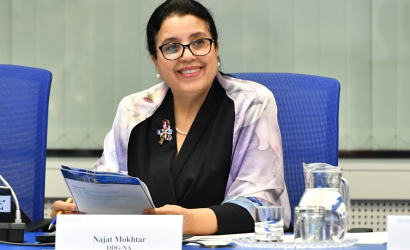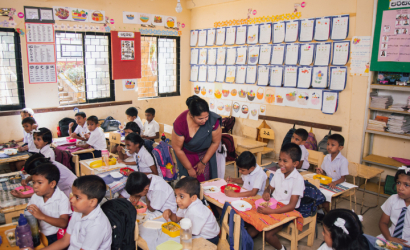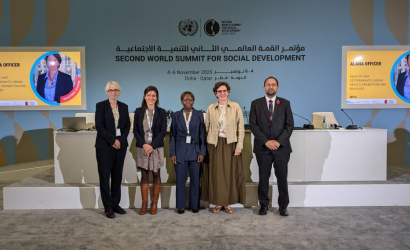In 2021, the United Nations General Assembly adopted a resolution to bring the global environmental community together in Stockholm, 50 years after the 1972 United Nations Conference on the Human Environment. Stockholm+50: a healthy planet for the prosperity of all – our responsibility, our opportunity” (Stockholm+50) took place on 2nd and 3rd June 2022, and provided global leaders with an space to discuss multilateral environmental action to accelerate the implementation of commitments in the context of the Decade of action and delivery for sustainable development.
A series of events and discussions provided an opportunity to bring nutrition to the table and re-affirm the important role sustainable healthy diets play in ensuring planetary health and prosperity for all.
UN Nutrition’s engagement
As part of these efforts, the UN Nutrition Chair, Dr Naoko Yamamoto, participated in the Leadership Dialogue 1: Reflecting on the urgent need for actions to achieve a healthy planet and prosperity of all and reiterated the importance of health equity and universal access to safe and nutritious food for all, including next generations. Regarding approaches to action, she underlined the need to apply three different approaches: One Health, since the health of humans, animals and ecosystems are closely interlinked; a systems approach, supported by multi-sector partnerships; and a greener approach, to reduce the burden to the planet and preserve biodiversity. Dr Yamamoto was one of the very few speakers who referred to the potential of food system approaches to address environmental challenges in their interventions.
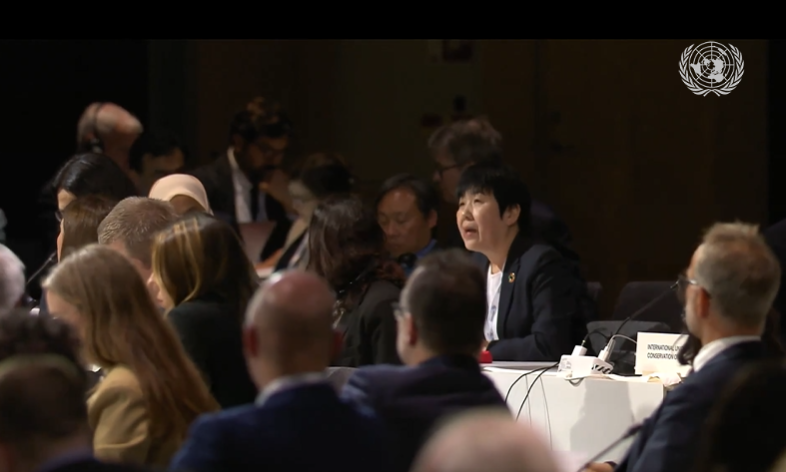
The conference closed with a statement from co-host countries, Sweden and Kenya, including several recommendations for an actionable agenda, such as placing human well-being at the centre of a healthy planet and prosperity for all; recognizing and implementing the right to a clean, healthy and sustainable environment; adopting system-wide changes in the way our current economic system works, and accelerate transformations of high impact sectors.
Associated event “Appetites for change: The power of food”
On 1st of June, the One Planet Network and the World Wildlife Fund (WWF), in partnership with other actors, including UN Nutrition, organized a full day hybrid event on food systems, titled “Appetites for change: The power of food”. Building on the unprecedented awareness about food systems approaches created by the UN Food Systems Summit in 2021, the event aimed at providing a space to discuss how food systems can contribute to reversing the triple environmental crisis (climate change, pollution and biodiversity loss) and achieve the Sustainable Development Goals (SDGs).
The morning focused on the importance of adopting a food systems approach, while in the afternoon champion countries, cities, and communities had the chance to highlight critical system-based solutions to address human and planetary health and prosperity.
The inauguration session brought together the Executive Secretary of the UN Convention on Biological Diversity (UNCBD), the Deputy Executive Secretary of the United Nations Convention to Combat Desertification (UNCCD), and the Director of Communications and Engagement of the United Nations Framework Convention on Climate Change (UNFCCC), for a discussion on the challenges affecting the world’s population and the need to work together to transform food systems to address climate change, pollution and biodiversity loss to benefit both people and the planet.
“Food system is one of those issues that connects the dots. It is a social problem, it is an economic issue, and it is a development issue” said Ms. Elizabeth Maruma Mrema, Executive Secretary of the UNCBD. “We need to enable more sustainable healthier diets which really emphasize diversity of consumers’ choices. This is where the issues of education and awareness raising come in. It is your choice and my choice in terms of what to eat. It is not the government, neither the industry. We determine the markets.”
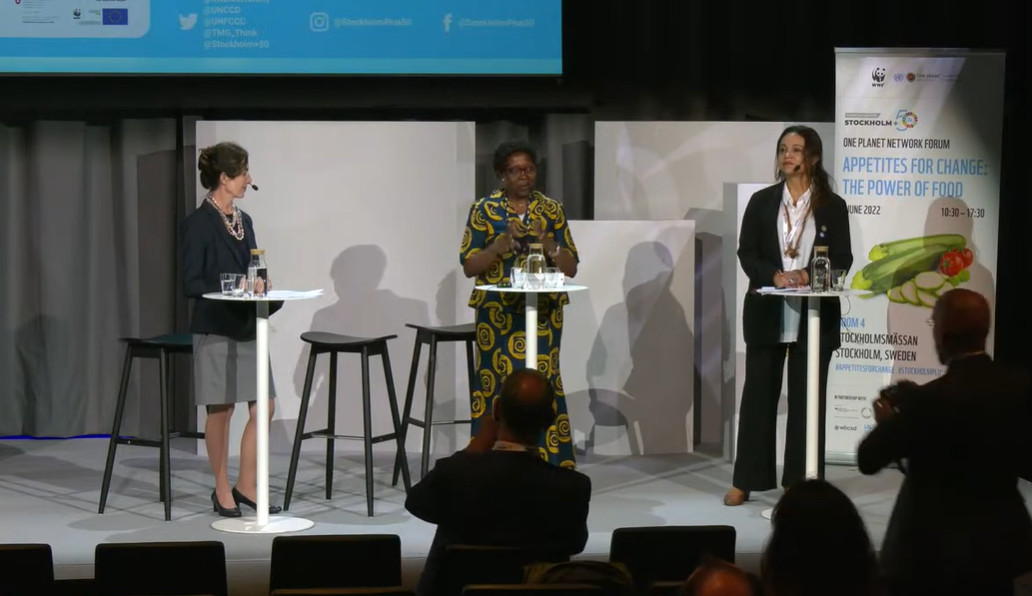
After the inauguration, Mr. Alexander Muller, Director of the TMG Research gGmbH, took the stage for a presentation on the power of food systems thinking and the importance of acting now to transform our failing food systems. How? Shift from fossil fuels to renewables, change our diets, ensure the right to food, tackle food losses and waste, build a good governance, and implement short-term solutions linked to longer-term transformative solutions to achieve real change. In his remarks, Mr. Muller called for greater solidarity towards countries in need, with countries in the global north committing to share their stocks to avoid further disruptions in global food system.
The full programme and recording of the entire event are available on the event web page.
UN Nutrition co-organized a session in the afternoon focused on nutrition and highlighted how the nutrition and environmental communities can work together and benefit from each other’s work.
The UN Nutrition Executive Secretary kicked off the discussion by applauding the momentum in the environmental world to work on food and nutrition, while emphasizing the urgency to do more. With the three Conferences of the Parties (desertification, biodiversity and climate change) taking place throughout 2022, we have a great opportunity to advocate for food and nutrition and link them to environmental discussions.
Sara Farley, Vice President of Rockefeller Foundation’s Food Initiative, presented the Foundation’s “good food” strategy according to which food needs to nourish, be produced to be regenerative of the environment, and be equitable. She provided insights from several innovative nutrition-positive and budget-neutral projects, including one on fortified whole grain for school meals in Rwanda, implemented in collaboration with WFP.
The panelists focused on country experiences: Ms. Wubet Girma, Director of the GAIN Country office in Ethiopia, shared insights about activities in support of integrated food systems planning with a focus on climate change mitigation and adaptation. Two government representatives, Ms. Anne Pøhl Enevoldsen, Head of Division of Sustainable Diet and Health in the Danish Veterinary and Food Administration (DVFA), and Mr. Roberto Azofeifa, Chief of Agro-environmental Production Department at the Extension Head Office in the Ministry of Agriculture and Livestock, in Costa Rica, talked about the process to develop Food Based Dietary Guidelines (FBDGs) that include sustainability criteria. Ms. Selamawit Negash, Nutrition Specialist at the UNICEF Cambodia Country Office, explained how the rise of global food prices would impact the provision of locally produced fish based ready to use therapeutic food (RUTF) by on one hand, increasing the number of malnourished children with consequences on the demand for RUTF, and on the other hand, affecting the costs of producing them.
In less than one hour, speakers highlighted many of the tools we have to transform our food systems starting from the food environment: food based dietary guidelines, food labeling, subsidies, public procurement and more. Panelists also stressed the need to work across all sectors and with all actors to build stronger partnerships and good governance for nutrition. The recording of this session is available at this link.
Strengthening nutrition-environment linkages…What’s next?
One of the two UN Nutrition’s predecessor, the UN Standing Committee on Nutrition (UNSCN), started discussing the linkages between climate change and nutrition already in 2010, with the publication of the SCN News 38: Climate Change: Food and Nutrition Security Implications, and then again in 2017 with the Discussion Paper – Sustainable Diets for Healthy People and a Healthy Planet. These efforts to connect the dots between sustainable food systems, dietary patterns, health, nutrition and climate change mitigation continued and evolved throughout the years, with new evidence being produced and more actors, including non-conventional nutrition actors, being involved in the discussions.
In 2021, the year of action on nutrition, UN Nutrition actively engaged in the UN Climate Change Conference (COP26) to bring nutrition into the discussions taking place outside of the negotiation rooms. Earlier this year, UN Nutrition has officially identified as one if its top priorities ‘healthy diets from sustainable food systems’. In line with its work plan, and using nutrition as a connective tissue among environmental discussions, UN Nutrition participated first in the UNCCD15 that took place in May in Côte d’Ivoire, then in Stockholm+50, and will contribute to the discussions during COP27.
Currently, the UN Nutrition member UN Environment Programme (UNEP), supported by the secretariat, is working specifically on this topic, bringing together the environment and nutrition communities to build a strong and context specific narrative around healthy diets from sustainable food systems. A discussion paper will be presented at COP27, where UN Nutrition will join efforts with several partners, including WWF, the One Planet Network for Sustainable Food Systems and a growing number of Member States.
In the meantime, on July 28th, the UN General Assembly adopted an historic resolution (A/RES/76/300) recognising for the first time, that everyone, everywhere, has a human right to live in a clean, healthy and sustainable environment. “The health and quality of life of everyone directly depend on clean air to breathe, safe water to drink, sustainably produced food to eat, non-toxic environments, a safe climate, and healthy biodiversity and ecosystems,” said the UN Special Rapporteur on human rights and the environment, David R. Boyd. “The human right to a clean, healthy and sustainable environment, as recognized universally today, includes all of those substantial elements.”
This UNGA resolution, as well as the increasing collaboration between the nutrition and environment communities, constitute an important step in the right direction. However, we are still not there yet, and this is why it is essential to keep advocating about the central role of food systems, being both one of the causes of our current challenges, but also part of the solution to ensure human and planetary health.
